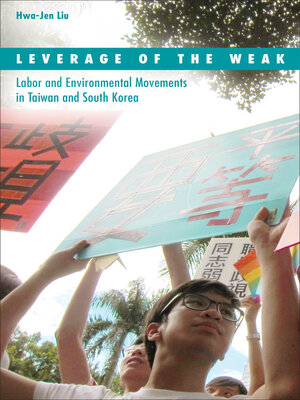Leverage of the Weak
ebook ∣ Labor and Environmental Movements in Taiwan and South Korea · Social Movements, Protest and Contention
By Hwa-Jen Liu

Sign up to save your library
With an OverDrive account, you can save your favorite libraries for at-a-glance information about availability. Find out more about OverDrive accounts.
Find this title in Libby, the library reading app by OverDrive.



Search for a digital library with this title
Title found at these libraries:
| Library Name | Distance |
|---|---|
| Loading... |
Comparing Taiwan and South Korea strategically, Hwa-Jen Liu seeks an answer to a deceptively simple question: Why do social movements appear at different times in a nation's development?
Despite their apparent resemblance—a colonial heritage, authoritarian rule, rapid industrialization, and structural similarities—Taiwan and South Korea were opposites in their experiences with two key social movements. South Korea followed a conventional capitalist route: labor movements challenged the system long before environmental movements did. In Taiwan, pro-environment struggles gained strength before labor activism. Liu argues that part of the explanation lies in an analysis of how movements advance their causes by utilizing different types of power. Whereas labor movements have the power of economic leverage, environmental movements depend on the power of ideology. Therefore, examining material factors versus ideational factors is crucial to understanding the successes (or failures) of social movements.
Leverage of the Weak is a significant contribution to the literature on social movements, to the study of East Asian political economies, and to the progress of the comparative-historical method. It enhances knowledge of movement emergence, investigates the possibilities and obstacles involved in forging labor–environment alliances, and offers the first systematic, multilayered comparisons across movements and nations in East Asia.







